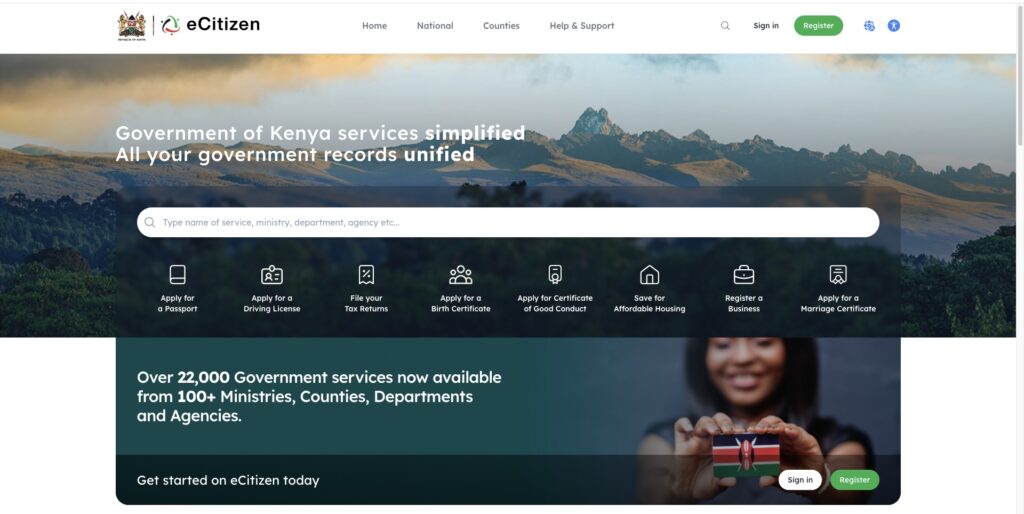Table of Contents
- Eligibility Requirements for the Kenya Digital Nomad Visa
- Is There Another Way to Enter Kenya for Remote Work?
- What About a Kenyan Tourist Visa?
- Alternatives to Kenya for Digital Nomads?
- My Thoughts on the Kenya Digital Nomad Visa
- The Bottom Line
The Kenya digital nomad visa was launched in 2024. It excited remote workers and freelancers keen to spend time on the country’s fabulous white-sand beaches and around the famous national parks.
I have spent time as a digital nomad in Diani and Mombasa. Diani is a brilliant spot for nomads, while I prefer the chilled, laid-back vibes of Mombasa to the hectic and frenetic pace of life in Nairobi.
Anyway, in this article, I explain everything you need to know about the Kenya digital nomad visa, including how and where to apply this year.
Eligibility Requirements for the Kenya Digital Nomad Visa
The Kenya digital nomad visa was approved in October 2024 after much deliberation. It’s officially known as the Class N Work Permit and comes with the following eligibility requirements:
| Permitted length of stay | One year (renewable) |
| Tax implications | No local tax liability (please consult a digital nomad tax specialist for further guidance) |
| Eligible nationalities | All foreign nationals who meet the income requirement |
| Cost of visa | US$200 application fee (plus $1,000 issuance fee upon approval) |
| Minimum income requirement | US$55,000 annual salary (earned outside of Kenya) |
Kenya’s president recently simplified the visa and work permit application processes, making it easier to apply online. For further information relating to Kenyan visas and permits, visit the eVisa Hub here.
Kenya Digital Nomad Visa Application Process

Frankly, this visa is wide open and extremely easy to apply for. You can do the entire process online, and as long as you have the correct documentation, your application should be approved within seven to fourteen days. Here are the steps you must follow:
- Check the eligibility requirements: First and foremost, check that you’re eligible for the Kenya digital nomad visa. You must earn at least $55,000 from outside of Kenya, and your passport should have at least six months of validity beyond your desired stay.
- Prepare the required documentation: You will need the following documents to apply online for this visa:
- Passport-sized photograph (must be in colour)
- Valid passport (at least six months beyond intended stay)
- Current immigration status (if you’re currently in Kenya)
- A signed cover letter from you (addressed to the Director General of Immigration Services, detailing your work and intended stay in Kenya)
- A signed cover letter from your employer or clients, showing your income
- Proof of financial stability (bank statements or payslips from the last three months)
- Proof of accommodation in Kenya (a hotel, apartment, or Airbnb reservation for your stay)
- Letter of no objection from your embassy – Find out more about this document here
- Create an account on Kenya’s e-citizen portal: Sign up for Kenya’s e-citizen portal to submit your application online.
- Submit your application and pay your fees: Follow the prompts in the portal and pay the $200 application fee.
- Await approval: Before travelling to Kenya, await approval, and once your visa is issued, arrange to collect and personalise it before departure.
Is There Another Way to Enter Kenya for Remote Work?
As is the case with many countries worldwide, obtaining the relevant work permit is the only way to work legally in Kenya.
Currently, Kenya offers Class A to Class N work permits, ranging from prospecting & mining to approved religious or charitable activities.
You can find a detailed breakdown of all of the available work permits, as well as details of how to apply for them, here, via the Kenyan Directorate of Immigration Services.
Basically, to legally work in Kenya for an organisation within the country, you need to be sponsored by a Kenyan-registered company, as one of the main requirements is to provide an invitation letter.
The Class N digital nomad visa is obtainable only by people who companies or clients outside of Kenya employ. So, if you plan on staying in the country beyond the limits of a tourist visa, it’s the only option for remote workers.
What About a Kenyan Tourist Visa?

A Kenyan tourist visa (known since 2024 as an ETA) is extremely easy to apply for, and you can do so online, via the government’s electronic visa portal. When I visited Diani Beach for a family holiday last year, I obtained my ETA in less than two days, and it was an extremely easy and effortless process.
Now, can you enter Kenya as a digital nomad on a tourist visa? Legally, no, you can’t, as the tourist visa clearly stipulates that any work is prohibited during your stay in the country.
I’m a member of several online digital nomad communities, and I know of people who enter various countries around the world as digital nomads on tourist visas. However, it’s not legally permitted in Kenya, and I wouldn’t advise you to do so.
There’s also no need to do it, now that the Kenya digital nomad visa is live and available online.
If you’re planning to visit multiple East African countries on an upcoming trip, starting in Kenya, check out my complete guide to obtaining the East African Tourist Visa.
Alternatives to Kenya for Digital Nomads?
As Kenya is still a newcomer to the digital nomad space and other East African countries like Uganda and Tanzania lag behind, where else can you work remotely in this part of the world?
In my opinion, the best country in East Africa for digital nomads is Mauritius – a stunning island off the continent’s East coast with one of the easiest digital nomad visas to apply for.
You can apply for a Mauritius digital nomad visa if you earn more than $1,500 monthly and meet some other pretty basic requirements. Learn more about becoming a digital nomad in Mauritius here if you’re not sold on Kenya.
My Thoughts on the Kenya Digital Nomad Visa
I love Kenya. It’s a country of so many options and opportunities. From a digital nomad perspective, the appeal is clear:
- The cost of living is much cheaper than in practically all Western countries.
- Most major cities (Nairobi, Mombasa, Kisumu, etc.) offer great value short-term rentals.
- There are stunning beaches and gorgeous national parks to explore.
- Internal flights are cheap, trains run between major cities, and you can use motorcycles (boda-bodas or piki-pikis) and tuk-tuks to get from A to B cheaply, without renting a car.
- Major international supermarkets like Carrefour are available in most cities and towns.
- Restaurants, bars, coffee shops, and other entertainment venues are everywhere, offering great value and good food.
- Most Kenyans are extremely friendly. Nairobi has an edge and a bad reputation for crime. But, on the whole, most Kenyans you meet are great.
- Co-working options are becoming more widely available in Kenya. Personally, I hot-desk at Regus’ offices when I’m in Mombasa, but there are many other options in all major cities in the country.
If you’re excited about the prospect of the Kenya digital nomad visa, I highly recommend Mombasa. It’s a charming, old city with a Swahili influence. The food is excellent and the people are friendly. It’s also the gateway to Kenya’s Swahili coast, which includes resorts like Kilifi, Lamu, and my favourite spot, Diani.
You can get from Nairobi to Mombasa on a night train, which is super safe and lots of fun. Alternatively, book an internal flight and get there in just over an hour. Either way, it’s well worth the effort, as Nairobi is difficult to adapt to, particularly if you’re new to Africa.
The Bottom Line
At the time of this writing, I’ve worked as a digital nomad in Kenya three times—twice in Diani and once in Mombasa. I only ever use Nairobi for transit, as I’m not a huge fan of the city and prefer my home base in Kampala, Uganda.
The bottom line? Now the Kenya digital nomad visa is live and available online, plan your visit to this stunning country – you won’t regret it. Though I live in Uganda right now, I’m certainly not ruling out a spell as a digital nomad family in Mombasa in the future.




